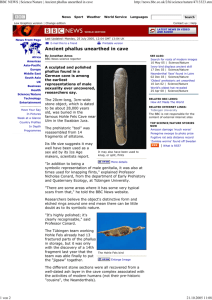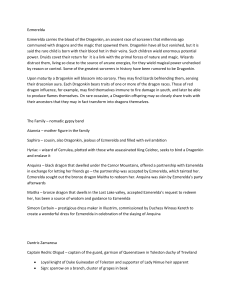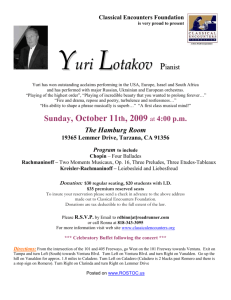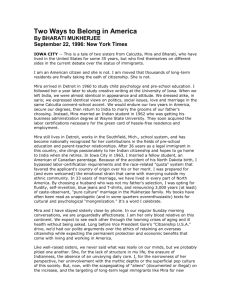Female subject and her gaze: From Stairway to Heaven to Palace
advertisement
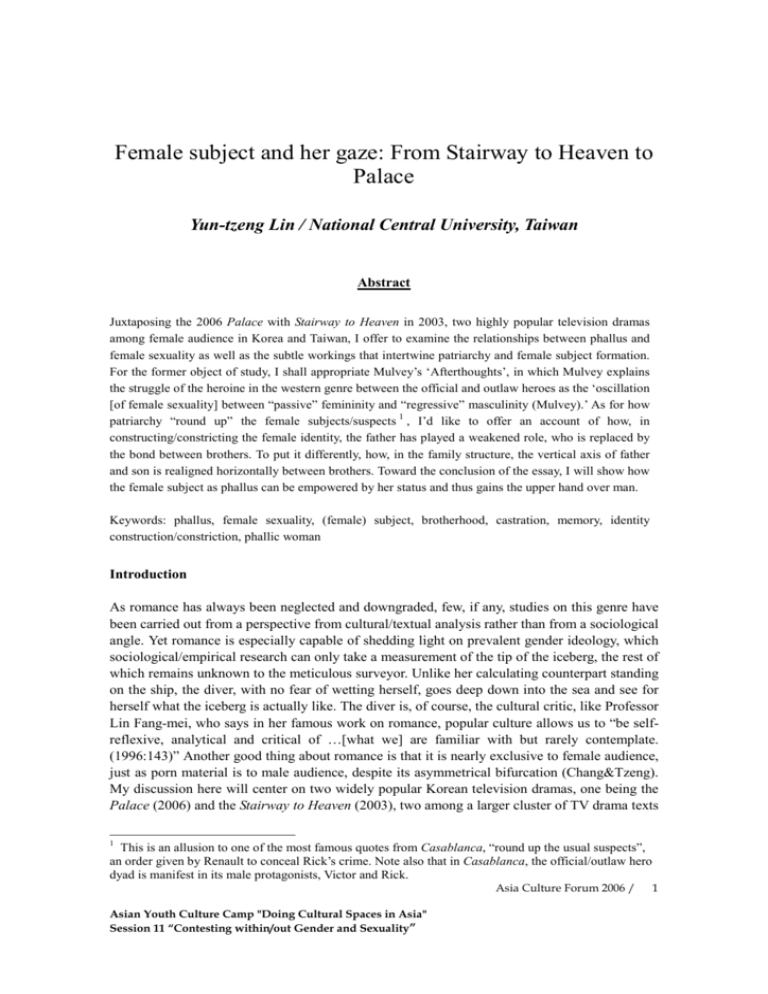
Female subject and her gaze: From Stairway to Heaven to Palace Yun-tzeng Lin / National Central University, Taiwan Abstract Juxtaposing the 2006 Palace with Stairway to Heaven in 2003, two highly popular television dramas among female audience in Korea and Taiwan, I offer to examine the relationships between phallus and female sexuality as well as the subtle workings that intertwine patriarchy and female subject formation. For the former object of study, I shall appropriate Mulvey’s ‘Afterthoughts’, in which Mulvey explains the struggle of the heroine in the western genre between the official and outlaw heroes as the ‘oscillation [of female sexuality] between “passive” femininity and “regressive” masculinity (Mulvey).’ As for how 1 patriarchy “round up” the female subjects/suspects , I’d like to offer an account of how, in constructing/constricting the female identity, the father has played a weakened role, who is replaced by the bond between brothers. To put it differently, how, in the family structure, the vertical axis of father and son is realigned horizontally between brothers. Toward the conclusion of the essay, I will show how the female subject as phallus can be empowered by her status and thus gains the upper hand over man. Keywords: phallus, female sexuality, (female) subject, brotherhood, castration, memory, identity construction/constriction, phallic woman Introduction As romance has always been neglected and downgraded, few, if any, studies on this genre have been carried out from a perspective from cultural/textual analysis rather than from a sociological angle. Yet romance is especially capable of shedding light on prevalent gender ideology, which sociological/empirical research can only take a measurement of the tip of the iceberg, the rest of which remains unknown to the meticulous surveyor. Unlike her calculating counterpart standing on the ship, the diver, with no fear of wetting herself, goes deep down into the sea and see for herself what the iceberg is actually like. The diver is, of course, the cultural critic, like Professor Lin Fang-mei, who says in her famous work on romance, popular culture allows us to “be selfreflexive, analytical and critical of …[what we] are familiar with but rarely contemplate. (1996:143)” Another good thing about romance is that it is nearly exclusive to female audience, just as porn material is to male audience, despite its asymmetrical bifurcation (Chang&Tzeng). My discussion here will center on two widely popular Korean television dramas, one being the Palace (2006) and the Stairway to Heaven (2003), two among a larger cluster of TV drama texts 1 This is an allusion to one of the most famous quotes from Casablanca, “round up the usual suspects”, an order given by Renault to conceal Rick’s crime. Note also that in Casablanca, the official/outlaw hero dyad is manifest in its male protagonists, Victor and Rick. Asia Culture Forum 2006 / Asian Youth Culture Camp "Doing Cultural Spaces in Asia" Session 11 “Contesting within/out Gender and Sexuality” 1 in which there is inevitable Cinderella Complex, namely, the female (audience?) desire to marry the Prince Charming of a higher socio-economic standing and the love affair is always trapped in a quadrangle relationship where two boys as brothers or bonding like brothers contend with each other for the love of a girl while the two girls, contrary to their male counterparts, are, in most cases, working against, and/or antagonistic to each other.2 Of the latter pair, one of them is bound to lose, even from the beginning episodes of the show whereas the competition between two heroes remains unclear about where the girl’s heart belongs till toward the ending, despite the knowledge viewers have gained from commercials. Other than the above-mentioned, I will attempt to achieve what Professor Lin Fang-mei hopes can be done to pop culture, by the use of psychoanalysis. Part of the purpose of writing this essay lies in the defense of psychoanalysis, which has been held by a substantial number of people to be nonsensical rambling. As in Laura Mulvey’s monumental work “Visual Pleasure and Narrative Cinema,” in which she puts psychoanalysis to its “political” use (2182). I have always thought of psychoanalysis as “valid phallusy,” which as Juliet Mitchell believes, is only descriptive of, rather than justifyingly appreciative of patriarchy, whose central target, in psychoanalytic terms, is the phallus. The phallus, in Lacan’s scheme, is not only the ‘signifier of (the other’s) desire’ but ‘signifier of the signifiers’ for the reason that “it both constitutes lack and functions to fill the lack, just as the [Saussurean] sign” is present only to fill the absence of the actual object (Lacan, quoted in Grosz 1990: 202 n4). Adopting Elizabeth Grosz’s interpretation of the phallus, which, unlike Juliet Mitchell and Ragland-Sullivan’s belief in its neutrality and arbitrariness as a mere sign in the signifying chain, takes the phallus to be “socially and politically motivated” and the “crucial signifier in the distribution of power, authority,” which can be “circulated as the Symbolic object in social exchange”(Grosz 124-6&202-3 n6).” This definition, by which Elizabeth Grosz manages to save the phallus from its seeming essential status, applies well in the discussion on the two texts. Herein the phallus, in the gendered form of male protagonist Cha Song-ju and princess Chae-kyung, poses as if it could fill the lack in their targeted (female) audience. The former as the hero occupying the most desired subject position of the heterosexual male in the sexual hierarchy and the latter, despite its feminine position, still being the most desired by and apparently torn between the princes. What figures most prominently in the two texts and others belonging to the cluster I mentioned, is that, in the family structure the formerly the vertical axis of father and son is now realigned horizontally between brothers. And this axis, to put it in a feminist expression, is responsible for the construction and/or constriction of the female sexuality&identity. This phallic wedding officiated by me may be a blind one yet blind marriages still can turn out a happy ending, like that of Chae-kyung to Shin in the Palace. The two texts are chosen, as the one is representative of the male lead character as the most desired phallus while in the other, the phallus is embodied by a female desired by the most desired males. Within this Freudian/Lacanian framework, I will draw on the work by Sandra Gilbert and Susan Gubar— The Madwoman in the Attic, in which the idea of “social castration” proposed by Elizabeth Janeway is aptly deployed (272-3). The other major source will be Laura Mulvey’s "Afterthoughts on 'Visual Pleasure and Narrative Cinema’,"which explains the struggle of the 2 A number of examples from this cluster will be: Winter Sonata (2002), Lovers in Paris (2004), The Spring Day (2005) 1% of something (2006), among others. Asia Culture Forum 2006 / Asian Youth Culture Camp "Doing Cultural Spaces in Asia" Session 11 “Contesting within/out Gender and Sexuality” 2 heroine in the western genre between the ‘official and outlaw heroes”3 as the ‘oscillation [of female sexuality] between “passive” femininity and “regressive” masculinity (Mulvey 31).’ As the ‘wedding ceremony’ goes on, I’d like to announce how we shall proceed: the first half of the main body will be a brief plot summary of the Stairway to Heaven, followed by the discussion which finally points to the male protagonist, Cha Song-ju as our ‘phallic bridegroom.’ The female protagonist in Palace Chae-kyung will be the focus of attention as his ‘better half.’ The we’ll see if their union is a blind one or not.4 To refresh your memory, what follows first will be the synopsis: unlike Cinderella, who successfully ascends the social throne at the end of the fairy tale, Han Jung-suh (韓靜書) has led a miserable life since her step-mother Tae Mira (苔美蘿) moved in with her daughter Han Yuri (韓友莉), both of whom have since treated her badly. Worse things happened when Yuri hit Jung-suh in a car accident. Desperate, Yuri went to her brother Han Tae-hua (韓泰華), and asked him to dump Jung-suh’s body for her. Secretly long in love with Jung-suh, Tae-hua, who discovered she was only wounded, persuaded his (and also Yuri’s) father Han Pil-su, divorced by Mira, to take Jung-suh away and give her a new identity by lying to her that she, by the name of Kim Ji-suh (金智秀), lost her family in a fire, from which only she was rescued. Five years later, Ji-suh met her ex-boyfriend Cha Song-ju (車誠俊) again, who had long believed her dead and thus had been engaged to Yuri but who still loved her. Suffering from loss of memory caused by the car accident, Ji-suh first thought Song-ju only mistook her for Jung-suh but, as the drama unfolds, came to feel closer to Song-ju, who tried everything to revive their past happy memories. Finally in a narrow escape from being hit again by Yuri, all of Jung-suh’s past memories came rushing back into her mind. She at once came to the bitter realization that she would have been the Cinderella, the rightful fiancée to Song-ju, had the car accident not happened five years ago. Castration&Memory in the Stairway to Heaven As the “lynchpin of the psychoanalytic theory,” castration both marks the resolution of the Oedipus Complex and means the emergence of superego in Freudian theory (Bronfen 41). Lacan later on saved Freud from biologism by rereading it as the marker/maker of sexual differences prescribed by language (Bronfen 43). Either way, castration can be now condensed as deprivation, separation and alienation, whose effects apply equally well to both sexes (Bronfen 43-5&Fink 99-101). Of all the reformulations of this notorious Freudian concept, the most politically engaging and useful in practical criticism, in my own opinion, is a feminist one, proposed by Elizabeth Janeway5 and applied fittingly in their analysis of Wuthering Heights: But she has been deprived of something else that men enjoy: namely, autonomy, freedom, and the power to control her destiny. By insisting, falsely, on the female deprivation of the male 3 The terms, “official and outlaw heroes” are actually coined by Robert Ray, in his A Certain Tendency of the Hollywood Cinema, 1930-1980; however, Mulvey attributes her analysis to Morphology of the Folk-tale by V. Propp. 4 Since nearly all Korean television dramas imported to Taiwan are dubbed with Chinese subtitles (Sometimes even the incidental music is different!!), there may be a discrepancy between my understanding and that of the Korean TV viewers. If there is any inappropriate translation or misunderstanding in my essay, I will be receptive to any feedback on that matter. 5 See Elizabeth Janeway, “On Female Sexuality” in Jean Strouse, ed. Woemen and Analysis (New York: Harper&Row, 1974), p. 58 Asia Culture Forum 2006 / Asian Youth Culture Camp "Doing Cultural Spaces in Asia" Session 11 “Contesting within/out Gender and Sexuality” 3 organ, Freud is pointing to an actual deprivation and one of which he was clearly aware. In Freud’s time the advantage enjoyed by the male sex over the inferior female were, of course, even greater than at present, and they were also accepted to a much larger extent, as being inevitable, inescapable. Women were evident social castrates, and the mutilation of their potentiality as achieving human creature was quite analogous to the physical wound. (quoted in Gilbert&Gubar from Janeway) The story is basically full of castrated characters, in ways that differ from one another. Flanked by female and male castrates on both sides, the lost, unseizable phallus, embodied as male lead Cha Song-ju, emits an aura to both sides differently. On the female side, where stand Mira, Yuri and Han Jung-suh who all look at the alluring phallus in awe. On the other kneel Mr. Chang (張 理事), literally Director Chang from the Chinese subtitle, Tae-hua, his father Han Pil-su and Han Jung-suh’s father Proffesor Han, who subordinate themselves to Cha Song-ju, the only uncastrated character. Those on the female side are all castrated for their biological and social lack, as prescribed/described by classical psychoanalysis and Janeway, in other words, they are castrated because they are women, who all desire Song-ju, as the general manager of a large corporation and only son to its chairwoman, namely, the sole heir to the throne. Against Mira and Yuri both as her background and enemies, Jung-suh stands out the most. For she is, since the car accident where Yuri hits her, deprived of both her past identity as Han Jung-suh, the holder of the phallus, the wife-to-be to Song-ju and the happy memories with Song-ju, which, like “the return of the repressed”, functions as her main source of comfort/pleasure in her distress and sadness. Yuri and her mother Mira also On the male side, the castration is both cultural and sexual and only tinged very slightly with psychoanalytic theory. Of all the male roles, the most curious and interesting one is probably Mr. Chang (張理事), a middle-aged Caucasian male, who speaks proficient Korean. He is a role I’d like to name “servantal parent.” He is apparently a high-ranking business executive in the company yet his presence is always required by Song-ju’s personal needs, ranging from investigating Ji-suh’s identity, guarding his meetings with Ji-suh from Yuri’s interruption, and many other chores and errands. Reminiscent of the eunuch in the imperial Chinese palace (perhaps Korean palace, too?), he is close to the center of power and can thus gain access to and sometimes wield the power originally not meant for him and once with that power, can stand next to the top of the power hierarchy, subordinate only to the emperor and superior to all the others. The castration of the rest of the male roles, is largely used here figuratively and roughly used as the equivalent of impotence, weakness or powerlessness. Tae-hua is the most apparently castrated one. The foremost reason is his lack of confidence and his siblinghood as Kim Ji-suh’s brother, (Though they both are aware of the fact that they are not biologically related.)6 who, during the five years of living with her, was provided for by Ji-suh, and who, with his own sense of inferiority to Song-ju, has been pushing Jung-suh back to Song-ju and even refrains from seeing her. Whether these are signs of lack of confidence or his unwillingness to be involved romantically with his ‘sister,’ it looks very suspiciously like sexual impotence. Despite the lack of knowledge both on the viewers’ part or characters’as to whether they are sexually impotent or 6 it has intrigued me that in Korean culture, even the love between step-brother and step-sister is forbidden, as in another less well-known Korean TV drama, the Piano, where this forbidden love is the central theme. Asia Culture Forum 2006 / Asian Youth Culture Camp "Doing Cultural Spaces in Asia" Session 11 “Contesting within/out Gender and Sexuality” 4 not, both fathers of Tae-hua and Jung-suh, or the previous and present husbands of Mira are shown to be castrated weaklings not only because of the minor parts they play throughout the series but also of Han Pil-su’s intention to use Jung-suh as a bread winner or of Jung-suh’s father’s inability to see clearly the truth. The former being an ex-convict, who gambles every penny away, the latter is no better because he has been precluded from the truth that Mira and Yuri are to blame for all the tragedy. What about the only exception—Song-ju? He is naturally the only “man” with a phallus: he is handsome, muscular, seemingly womanizing, rough with women (sometimes even with his true love Jung-suh) and in possession of the ultimate Phallus—being the heir apparent to a vast corporate kingdom. If all the castrates, regardless of their sex, are deprived of something that matters considerably to them, whose and what would be the most central? It is, unsurprisingly, memory. If we recall why Lacan says of the phallus as the “privileged signifier,” we can very conveniently arrive at the conclusion that the lost memory of Jung-suh is actually the phallus. For Jung-suh, her present memory of Song-ju signifies his absence, yet to Yuri and Mira, the presence of Jungsuh’s lost memory can very likely mean the absence of Song-ju, who would originally be their husband and son-in-law without Jung-suh’s memory. Thus it may easily explain in Lacanian terms why Jung-suh has always to defer her revealing her true identity: first, the memory is a (phallic) weapon she uses against Yuri and Mira; she cannot just throw it to Song-ju’s face, which may result in Song-ju’s disbelief in her and may bring Song-ju into the dilemma between Jung-suh and Yuri, Mira as well as Song-ju’s mother, the chairwoman of Song-ju’s company. Second, as the signifier whose presence is to fill the absence of the actual object, Jung-suh’s memory as phallus naturally cannot meet with Song-ju, which it signifies. Once the ‘actual object’ were there, the signifier would be useless. And worst of all, the phallic desire which animates the drama would be gone, and drop the rating dramatically. Furthermore, this phallic issue points directly to female subjectivity. If it is true that Jung-suh’s memory = phallus, and memory as the integral component of identity can contribute to this equation: memory = identity&subjectivity, then of course Jung-suh will be the female subject being the phallus. As the ‘signifier of the other’s (men’s) desire’, Jung-suh is only a woman, whose new, pseudo identity as Ji-suh, the unattainable phallus, is constructed by Tae-hua’s lies to her, and whose true identity as Jung-suh, the ‘signifier of Song-ju’s desire is re-constructed by his recounting of their past happy times. Here the clandestine contention between Song-ju and Tae-hua is shown as one of Song-ju prevailing over Tae-hua, for Tae-hua’s lies as stories to Ji-suh are never presented directly by any image while Song-ju’s reminiscence of their past, by being shown in a poignant manner, validates his author(ity) over Jung-suh. Hence, a typical woman “object” being constructed by men. Woman as construction will be thrown light upon by fitting the tree women into Freud’s structural model of the psyche: id, ego, and super-ego. As the story is basically a war between Yuri, Mira and Jung-suh, their respective personality traits can fit in the model: impulsive and hasty Yuri as id, her resourceful and cunningly manipulative and deceptive mother Mira as ego, and loving Jung-suh as superego. Such competition (Female ego fueled by id is finally suppressed by the superego.) is symbolic of a woman’s struggle for which method to follow to obtain the phallus. The superego’s triumph is not surprising since the superego is the by-product of Oedipus complex, the entry into the symbolic order “of the paternal code of laws and prohibitions,…based on acknowledging the primacy of the phallus (Bronfen 41).” The Oedipality Jung-suh exhibits in her defiance of Mira as a mother figure culminates in a scene where, with her memories restored, Jung-suh rushing to find Song-ju, blunders into the Asia Culture Forum 2006 / Asian Youth Culture Camp "Doing Cultural Spaces in Asia" Session 11 “Contesting within/out Gender and Sexuality” 5 elevator only to meet Mira, whom Jung-suh hatefully calls “Mom” and instantaneously reveals to Mira her true identity; stunned, Mira slaps Jung-suh, who right away seizes her hand which was about to fall on Jung-suh’s other cheek. Right at this instant, the elevator light went out, sinking everything in the dark. Rather than returning to the safely unlit and protectively balmy womb to join with the mother, the girl goes back in only to declare a civil war in a women’s realm, in contestation of a man. Wrapping up this section, it seems that there is little, if any, room for ideology other than phallocentrism. The hope for optimism points to the following discussion on the other case of female phallus. Works Cited 張如慧、曾靜悅 2000 〈 性別角色的學習--以國中女學生的羅曼史閱讀經驗為 例〉,載於何春蕤主編:《性/別政治與主體形構》,台北:麥田。 林芳玫 ( 1996 ) 。 《 媒體陽謀論--專業主義、精英文化與商業力量對女性的三重歧視 》 , 收錄於謝臥龍所編之兩性文化與社會,臺北:心理出版社,頁135-136。 Bronfen, Elisabeth. “castration complex.” Feminism and Psychoanalysis: a Critical Dictionary. Ed. Elizabeth Wright. Blackwell. 1992 Fink, Bruce. Gilbert, Sandra, and Susan Gubar. The Madwoman in the Attic—The Woman Writer and the Nineteenth-Century Literary Imagination. New Haven: Yale UP, 1979. Grosz, Elizabeth. Jacques Lacan. A Feminist Introduction. Routledge, London and New York. 1990 Mulvey, Laura. “Visual Pleasure and Narrative Cinema.” Norton Anthology of Theory and Criticism. Ed. Vincent B. Leitch. New York: W.W. Norton, 2001. 2181-92. Mulvey, Laura. "Afterthoughts on 'Visual Pleasure and Narrative Cinema' inspired by Duel in the Sun." Psychoanalysis and Cinema. Ed. E. Ann Kaplan. New York: Routledge, 1990. 24-35 Asia Culture Forum 2006 / Asian Youth Culture Camp "Doing Cultural Spaces in Asia" Session 11 “Contesting within/out Gender and Sexuality” 6

